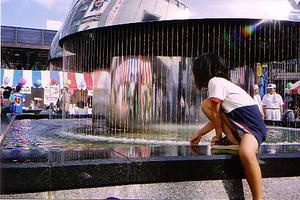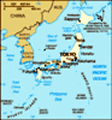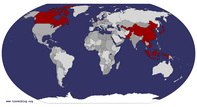Advertisement
Published: March 15th 2004

 beat the heat
beat the heat
weekend festival, August, iin front of Hiroshima StationArrival in August: humidity, typhoons, Atomic bombs and fireworks
A fellow ALT, Assistant language teacher, who greeted us first years at Hiroshima airport, having just flown in from an initial 3 day seminar in a 5 star hotel in Shinjuku, told us we were lucky to be posted to Kure. Why then did the young man at customs in Tokyo, seeing where I was headed to, laugh and say, "oooh, countryside". I had practised over and over again how to greet my new boss in Japanese.
Konnichiwa. Watashi wa Kebin desu. Dozo yoroshiku onegaishimasu. After gathering my luggage he approached me and without a bow curtly admonished that he was double parked and would we please get a move on. My senior ALT then explained that unfortunately our supervisor was an a*s. August was hot and sticky, especially wearing a suit and tie. I couldn't be bothered with dress shoes and wore sandals to work until my supervisor complained they made too much noise. I enjoyed meeting the ever expanding community of young foreigners now stranded in Kure and its surrounding towns. My co-workers at the board of education office included a Jamaican, a Singaporean, two Americans, two Brits,

 Miyajima
Miyajima
a weekend daytrip with my South African house mate, Martin. He takes more pics than I do!a Scot, a South African, and a Kiwi. Other JETS worked at nearby high schools and another couple dozen foreigners worked at half a dozen private English conversation schools, bringing the number to around fifty in a city of less than a quarter million most of whom are densely packed into a four square kilometre area surrounded by mountains and sea. The JET community numbered some two hundred or more in the prefecture. There were always things to do that summer: community festivals, barbecues, beach parties, impromptu house parties. I loved my new digs. For the first time I was living alone. My flat comprised of two 6 tatami mat rooms plus a kitchen with dining area, a toilet and a deep bath. It was furnished, south facing and centrally located, only a minute or two from the grocery store, work, the drinking quarter and half a dozen co-workers. The cockroaches took getting used to, as did my landlady's karaoke bar on the ground floor. Late summer all the insects and cicadas used my balcony as a morgue or as a hunting grounds for geckos and spiders large enough they made a sound when they fell. I liked sleeping on
a futon. I liked practising tai-chi on the tatami mat. I didn't like that a crowded medical office waiting room looked straight across the street into my flat. Nor did I much care for the constant traffic outside, commuters, trucks, mini-vans with blaring megaphones advertising noise pollution on sale. We didn't work too hard at the board of education. Lunch breaks in the park or at the local Indian would sometimes go two hours or worse, were relocated to the beach, only a few stations up the coast and last until sunset. Each weekend I took off to explore different historic towns in the ken: the temples in Onomichi, the amurai village in Takehara, the fishing village outside Fukuyama, and across the Inland sea, the castle town of Matsuyama.
Autumn: momiji & festivals & the honeymoon phase
September meant the return to school. Well, actually, all Japanese students attend school almost everyday in the summer, working on their summer assignments and training for their sport. But come September, regular classes resume. And my new job at the High School began - or so I expected. Various assemblies and festivals and special classes and meetings kept postponing my classes.
Seated at my desk from 830 to 430, Monday to Thursday, I had plenty of time to prepare lessons, meet with my new Japanese teachers, plan the season and study Japanese. One of the teachers informed me with a smile that my predecessor had spent most of his time tying fishing lures. I was also told that if I needed a nap, I could use the couch there in the English teachers office. Although the extreme heat and humidity were slowly wearing off, my body felt under a lot of stress and I made good use of the couch, earning 14$ each day on it. On Fridays, I had to leave earlier for work, hop a train, transfer onto a bus, and cross a bridge to a picturesque little island where I actually did a few hours of English teaching to bright eyed and bushy tailed Junior High students and in the afternoon, cute as buttons elementary children.
Two things soon became quite clear to me; one, I would continue to have very few responsibilities and way too much time to surf the net unless I started communicating my frustration with my job, and two, the students had very
little English communication skills so if I was going to make any contact with the student body, I needed to learn Japanese. My language studies progressed very slowly. Instead, I spent increasing hours immersed in my community of fellow English teachers perched on stools at the karaoke bar, exchanging ideas on what JET was really all about, some government hatched plot to magically internationalize the populace, create a falsified census that Japan was no longer a homogenized nation. With the end of the long hot days and the threat of typhoons ended, the beaches close and the crowds regroup around Shinto shrines and local temples, charging through the streets carrying mikoshi. Festive food stalls are erected selling hotdogs, fried squid and octopus, sweets, candied apples, games and prizes, recalling traditions of bygone days when Anpanman and Pokemon dared Smap singers to fierce hip-hop duels. Locals continue the rituals giving thanks to sake and rice and praying for another good season but mostly they seem to enjoy the mild weather, drinking beer for breakfast and scaring the children with the big angry devil masks. The mountains turn a vibrant array of fall colours lasting until mid December, beckoning the Japanese and
their digital cameras to celebrate momiji.
Winter: Insulated housing is for pussies, or End of the Honeymoon Period
The honeymoon period ended immediately following my amazing Xmas season spent in Vietnam. Japan, I was reminded, is expensive, is not tropical, is among the world's wealthiest nations and therefor, its citizens inherently hardworking and unhappy. The day to day continued to be stressful whenever I was required to speak with somebody. The melancholy and downcast look of everything contrasted to the adventure and colour of South Asia. At work I had a little more say over lesson content but it remained futile; sharing a fifty minute lesson with forty students three times a month without expecting them to do any homework or out of class assignment. Half of them zoned out in class unless I was bouncing off the walls, entertaining them like many of my junior high school colleagues had resorted to. My south-facing apartment let in a lot of wind and cold. I could see my breath and it was a bitch getting out of bed in the morning before the ground heater filled the room with enough warmth. I fell ill and my visit to the
doctors office caused me more stress than relief. My co-workers were great people, well-travelled, multi-lingual, adventurous, untraditional but I tired of them as well. Our on-going accounts to see whose job was worse started to do my head in. I'd come to Japan with the hope of instilling in a small number of its youth the knowledge that there were other ways to see the world. Unfortunately, I felt little connection with my students, ignored by the staff and often questioned the governments poorly spent money to bring English into the public school system. At an International festival in town, I gave a speech in Japanese, telling how my first time to Japan in '93 on a high school exchange had been an eye-opening experience. I'd felt treated like a King. This time, I felt treated like the jester, strange looks from passers by, and the monkey tricks required in the classroom.
In my free time I still found several diversions and pleasures. I soaked in the public bath once a week, including the electric current tub. Swam once a week in the olympic-sized pool at the navy base, trained at the gym, took walks into the hills or
up Niko Gorge, dined on Yaki-niku, gyoza, Korean, K's tacos or the Italian yatai. And spent at least one weekend a month partying in Hiroshima. (This of course predates the police crack-downs of 2006 when dancing became illegal.) My apartment was now decorated with weavings and wood puppets from Vietnam and ceramics from Korea. On weekends despite the cold, I relaxed at home with a late breakfast and got into a habit of studying the week's newspapers. And every Sunday at 2pm my landlord could be heard from downstairs practising his scales and a few traditional Japanese oldies in the Karaoke box. Everyday at sunset my neighbour rang her gong, lit incense and prayed at her altar. I soon took up a similar practice, erecting a shrine of photos and artwork so that in times of loneliness or unhappiness with life I could forget myself and concentrate my attention on loved ones. In mid-March the kids graduated. I couldn't see my breath inside my apartment anymore. And where the JET midyear conference failed to inspire, the plum blossoms, a delicate trace of colour in a blurred and grey city, as cliché as it may sound, renewed me with hope.
Advertisement
Tot: 0.071s; Tpl: 0.015s; cc: 8; qc: 28; dbt: 0.0256s; 1; m:domysql w:travelblog (10.17.0.13); sld: 1;
; mem: 1.1mb
























anonymous
non-member comment
Hi there, Kevin. I enjoyed reading this as it brought back lots of memories of being in Japan, JET and all the cool people we met there. I must say that I love your drawings as much as your photos - wonderful stuff. Hope you are keeping well. ~Martin